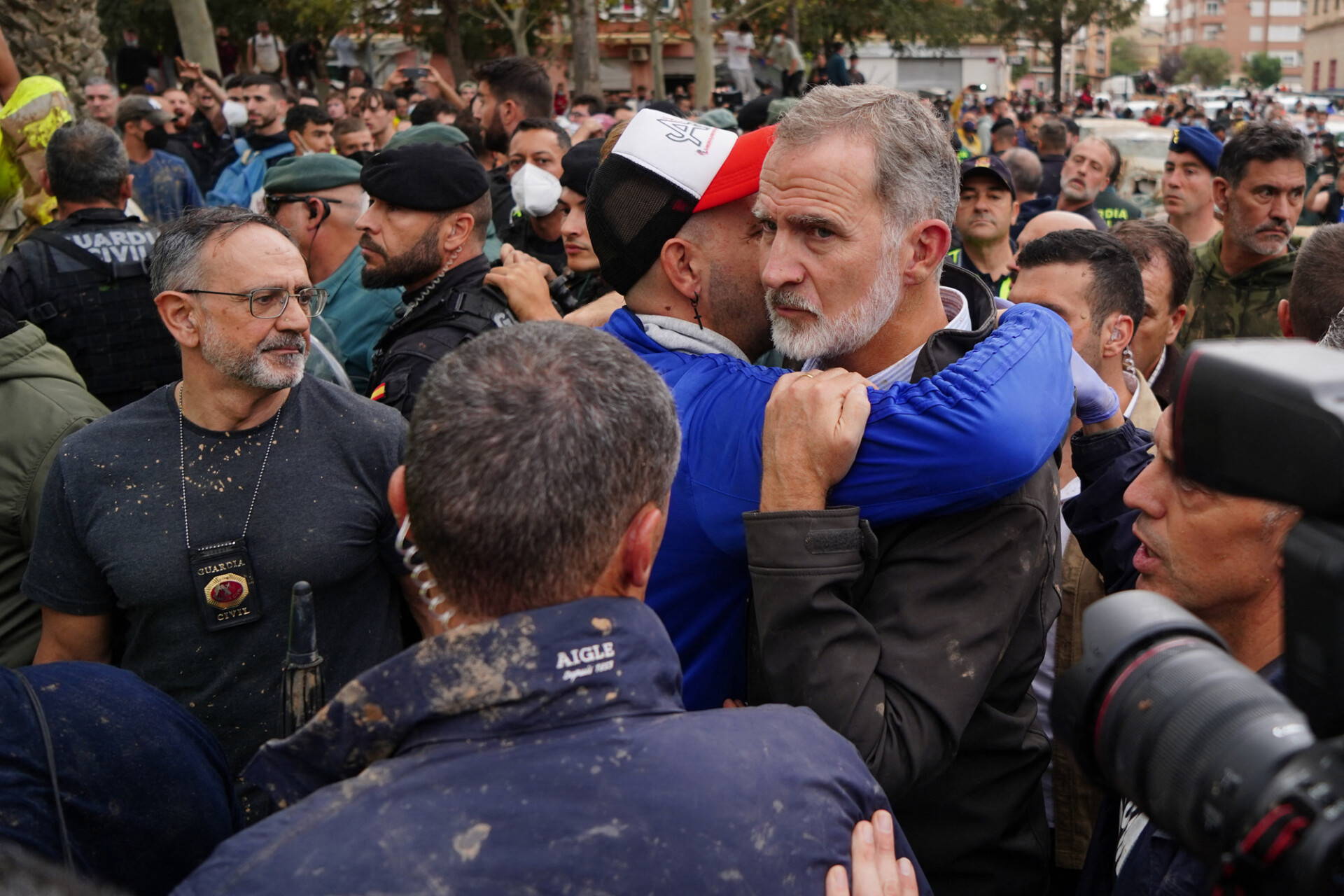It was, in the fullest sense of the word, a medieval scene. Devastating floods had just killed hundreds of people in Spain. Assailed by an angry mob of survivors throwing mud at the visiting dignitaries, Prime Minister Pedro Sánchez had fled the scene with his personal guard after being hit with a shovel.
Meanwhile, the King brushes away the protective umbrella brandied by a lackey, bends down — a ridiculously feudal touch, made necessary by the fact that he is almost a foot taller than everyone around him — to tell his entourage to back off, and plunges himself into a hostile crowd to hear their anger and comfort their sorrow. Later, the Prime Minister’s office would complain that the King should never have gone in the first place, much less drag his chief minister along.
That this tableau, which would have been intelligible to generations of our forebears, should have taken place in 2024 is entirely irrational. Spain is a constitutional democracy, in which King Felipe has no more power to direct the government’s rescue and recovery efforts than he has to govern by fiat and raise ship money. The Spanish monarchy has come under real criticism of late: back in June, 30,000 republicans marched in Madrid calling for its abolition. What’s more, Valencia, the former capital of the defeated republican government, is more hostile towards it than most of the country.
Perhaps there was also an element of public relations management from the Spanish royal household, which published a compilation of clips of the King speaking to and, in one instance, hugging two crying women, without accompanying commentary, as if it said everything that needed to be said. The complaints about royal security’s interference in rescue work was not mentioned.
But the instinct it revealed, though irrational in an age of constitutional government, is a deep-seated one. The instinct to run toward the personification of the state, to bitterly complain about the misdeeds of those who wield the actual power, has never vanished. In an age in which the actual mechanics of governance are as opaque as they have ever been, it tends to reassert itself in moments of crises.
Walter Bagehot, the vulgariser of the British constitution, saw it coming more than a century ago when he wrote that “[t]he best reason why Monarchy is a strong government is that it is an intelligible government.” Parliaments and party politics are “difficult to know and easy to mistake”; but when it comes to the basic principles of monarchy, “anybody can make them out, and no one can ever forget them.”
Bagehot was no defender of a politically powerful monarchy: he thought having a queen meant that those who were elected to govern could get on with it without public drama, a hope since dashed by the rise of quasi-presidential politicians whose private lives provide as much newspaper fodder as the doings of royals.
Yet the instinct to run to the dignified part of the constitution when the efficient part has failed persists. King Charles’s recent visit to Southport after the three murders there, where he was publicly cheered for no very apparent reason except that he was taking an interest in the lives of commoners, is but another example.
And whenever he or the late Queen Elizabeth have gone to places such as Canada and New Zealand, local indigenous leaders invariably ask to meet and to present their demands when it would be far more useful to lobby their MPs. The urge to complain to royals is so powerful in these countries that they have come to encompass governors-general, who are even more politically irrelevant than the monarchs they represent locally.
Indeed, the right to petition the king for redress — once considered so important the English Bill of Rights declared it illegal to make it a crime — still exists and is regularly exercised by desperate complainants, never mind that the invariable response is for such petitions to be referred to whichever department is concerned with it and to reply by way of a pro forma letter.
But petitions — which by law require no postage — keep coming in, even though almost the only official document acknowledging the existence of the right is a policy document of His Majesty’s Prison Service (only British prisoners have the constitutional right to petition the King, though foreign prisoners can do so as a matter of grace).
We sophisticates may well laugh at these futile gestures. We know that it is better to lobby our representatives, to write to newspapers, to post on social media than to waste the time of some royal correspondence officer. We may like to think of ourselves as rational, enlightened creatures, but there is an element of the pre-modern in all of us, which displays its full force when catastrophe hits.











Join the discussion
Join like minded readers that support our journalism by becoming a paid subscriber
To join the discussion in the comments, become a paid subscriber.
Join like minded readers that support our journalism, read unlimited articles and enjoy other subscriber-only benefits.
Subscribe